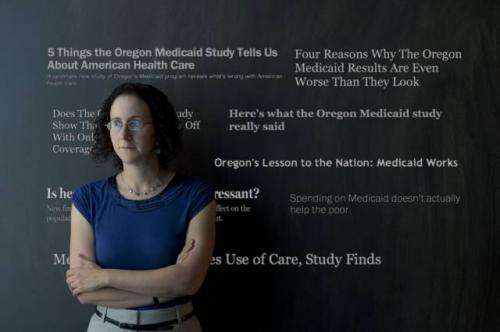Amy Finkelstein, an MIT economist, is principal investigator of the groundbreaking Oregon Health Insurance Experiment. Credit: Len Rubenstein
When Oregon voted in 2008 to use a lottery to determine which low-income adults to add to its Medicaid rolls, Stephen Colbert mocked the effort as "gambling for health insurance."
MIT economist Amy Finkelstein wasn't laughing.
"I heard about it and immediately thought, 'Oh my god, drop everything and get on this!'" says Finkelstein, the Ford Professor of Economics at MIT and a principal investigator of the groundbreaking Oregon Health Insurance Experiment. "What they saw as humorous, we saw as an unprecedented opportunity to bring the gold standard in scientific research to one of the most pressing questions of our day."
By using a lottery to assign coverage, Oregon had unintentionally created the perfect conditions for a randomized controlled trial that could reveal the true costs and benefits of health insurance. Since the population that received coverage was statistically equivalent to the group that didn't, economists could simply compare outcomes between groups to gauge the effects of insurance. "Remarkably, this had never been done before in the United States," says Finkelstein, who won the 2012 John Bates Clark Medal from the American Economic Association for most significant contribution to economic thought by an economist under 40.
The results were stunning. Researchers found, for example, that Medicaid increased health care use and reduced rates of depression, despite often-heard claims that Medicaid coverage was worthless. Medicaid also increased visits to the emergency room—notwithstanding many policymakers' predictions to the contrary. "The beauty and power of randomized evaluations is that they really allow you to be surprised," Finkelstein says.
The study also showed that health insurance successfully provides a financial safety net. "People often think of health insurance as a way of improving health, but to economists, health insurance is a financial instrument. The first idea is not to improve health but to protect you financially against large medical expenses," Finkelstein says. "We found Medicaid basically eliminates the prospect that a person will have a catastrophic financial issue."
The results from the Oregon Health Insurance Experiment made headlines again and again, underscoring for Finkelstein the power that randomized evaluations have to change both public perception and policy debate. "Nobody is arguing about what the results are," Finkelstein says. Instead, they're arguing about what to do with this new information—and that is the way of the future.
To catalyze a wave of similar research across the continent, Finkelstein last year helped launch the North American branch of MIT's Abdul Latif Jameel Poverty Action Lab (J-PAL), which pioneered the use of randomized evaluation to evaluate social programs.
"One of the reasons I cofounded J-PAL North America with Professor Lawrence Katz of Harvard is because we think [randomized evaluation] should be much closer to the norm than the exception in health policy," Finkelstein says.
Since most health care programs start small and ramp up, they are ripe for regular testing, Finkelstein notes. Already, J-PAL North America affiliates have completed five health-care studies, and the lab has lined up more than two dozen academics to conduct randomized evaluations of a wide range of social issues, from health care to education, crime, and discrimination.
As for Finkelstein herself, she is currently studying a Camden, New Jersey, program that provides intense after-care interventions for patients at high risk for repeat hospitalizations. Since the program can't yet accommodate all such patients, Finkelstein and her partners will compare results between those who receive the intervention and those who don't to see whether the program meets its goal of preventing future hospital visits.
"Ideally, most policies going forward would have an evaluation component built in so that we can tell the effects of a program," Finkelstein says. "My real hope is that this will become a movement."
Provided by Massachusetts Institute of Technology
This story is republished courtesy of MIT News (web.mit.edu/newsoffice/), a popular site that covers news about MIT research, innovation and teaching.





















